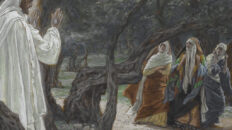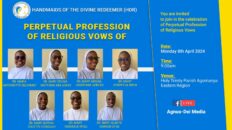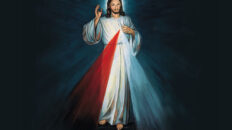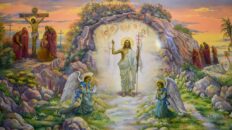THEME: NEW CREATION IN CHRIST
READINGS: Joshua 5:9-12 / 2 Corinthians 5:17-21/ Luke 1-3, 11-32
4th Sunday of Lent
Introduction
In our Lord Jesus Christ, God the Father makes us a new creation.
1. Our Old Self
Our old self is when sin dominates our lives. In today’s readings, we find at least two analogies for our old self. The first analogy is the state of slavery of the Israelites in Egypt (cf. Jos. 5:9). That is, as slavery entails hardships as well as the denial of people’s rights including their freedom, so in our old self, sin brings us hardships and denies us of our rights as children of God.
The Parable of the Prodigal Son provide us with the second analogy. Let us consider how this analogy elucidates the pathetic state of our old self. Firstly, the prodigal son’s misery began when he asked for his share of property. That is, to be away from the supervision of his loving father and to control his own destiny. Similarly, our old self of sin begins when we decide not to submit to the will of God, but to control our own destiny.
Secondly, as the prodigal son journeyed away to a far country, so sin separates us from God. Thirdly, as the prodigal son squandered his property, so sin means the loss of the grace of inheriting God’s kingdom. Fourthly, the prodigal son experienced a great famine. Similarly, when we become comfortable in living in sin, we experience the absence of God’s spiritual nourishment. Fifthly, in his poverty, the prodigal son entrusted himself to a citizen of the faraway country. Similarly, in the state of sin, we replace God as our Provider with the evil one as our provider. Then, as the prodigal son willingly accepted the task of feeding swine, a taboo task to Jews, so in sin, we may sink further into evil.
Such is the state of our old self of sin. God, however, does not abandon us in such willful misery. Rather, like the father of the prodigal son, God is always looking forward to our return to Him.
2. New Self in Christ
Our compassionate God initiates our recreation in Jesus Christ by giving us the grace to realize the extent of our willful misery and to take the steps to return to Him. Thus, according to today’s gospel reading, when the prodigal son “came to himself he said, ‘How many of my father’s hired hands have bread enough and to spare, but here I am dying of hunger! I will get up and go to my father, and I will say to him, “Father, I have sinned against heaven and before you …” (Luke 15:17-19).
As the father of the prodigal son embraced and kissed him, so our new creation in Jesus Christ means our full acceptance by the ever-compassionate God. He overlooks our sins, because Christ has paid for our sins: “For our sake God made Him [Jesus Christ] who did not know sin to be sin, so that in Him we might become the very holiness of God” (2 Cor. 5:21). So, when we truly repent of and confess our sins, God no longer sees our sins, but the sacrificial blood of His Son which still echoes His words on the cross: “Father, forgive them, because they do not know what they are doing” (Luke 23:34). St. Paul puts it this way: “God, in Christ, was reconciling the world to Himself, not counting the transgressions of men [and women] against them” (2 Cor. 5:19).
Furthermore, as the prodigal son was given a new robe, so we are clothed with the very holiness of God. Also, as the prodigal son was given a ring (which signified that he would still inherit his father), so we can inherit the kingdom of God. Then, as the prodigal son was given new shoes (which signified he was still considered a noble and not a mere servant), so we became part of the royal family of God. Again, as the prodigal son’s return occasioned a celebration, so in the state our new creation, the great famine of our old self is replaced by the abundance of God’s spiritual nourishment, while His angels and saints rejoice.
Conclusion
While we appreciate the overwhelming generosity of God’s love and mercy, we cannot but become His “ambassadors” (2 Cor. 5:20) with the “ministry of reconciliation” (2 Cor. 5:18). Thus, we have the joyful duty of inviting many others to take advantage of God’s abundant grace to turn away from sin and be reconciled to Him. May many more myriads of souls become new creation in Christ!
Amen!
By Very Rev. Fr. John K. Louis








